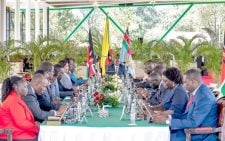China’s Global South policy is key

Facing a weak domestic market, increasing trade restrictions from the West and growing tensions with the United States, China seeks to mobilize support from the Global South to counterbalance the West in economic, security and ideological challenges.
During the G20 summit, Chinese leader President Xi Jinping announced the unilateral opening up of the Chinese Economy for the low-income countries that have established diplomatic relations with China. The announcement follows China’s recent commitment made last year to offer zero-tariff treatment on 100 per cent of tariff lines. These measures aim to reinforce China’s image as a proponent of free trade and globalisation for the Global South.
Driven by President Xi Jinping’s aim to build a shared “community of humankind”, China connects the development and security of Global South countries to its own goals. Through initiatives like the Global development security and civilization initiatives, China promotes its “China wisdom” to address challenges, emphasizing the security-development nexus where economic growth helps mitigate security concerns.
For decades China has hoped to inspire the Global South to adopt its model of modernization, demonstrating that developing countries can achieve stability and prosperity without relying on Western practices especially the United States. Unlike Western financing, China’s approach is often seen as attractive for its ability to provide much needed capital without conditionalities.
However, Global South countries have been quite wary of being caught in the crossfire of great power competition. This is because historically, many of these countries have advocated for non-alignment, a principle that seeks to maintain autonomy and avoid entanglement in great power competition.
While China’s rise could drive global governance reforms and challenges the Global North’s dominance, many countries remain cautious. Global South countries are concerned about overly dependent on China and fear that China’s increasing influence could replace one form of dominance with another. In addition, Global South countries are cautious about how their economic ties could be perceived by US President Donald Trump’s administration.
Trump administration is more willing to apply stricter and tighter controls over trade and investment with other Global South countries. This has made countries in the Global South to increasingly realize the importance of diversifying their trade patterns.
Historically, China has forged 15 Free Trade Agreements (FTAs) with Global South countries among its 21 FTAs with foreign governments to expand its economic influence in these countries and regions. And to reduce reliance on Western economies, China has boosted trade and investment with economic unions, organizations and regions like African Union, the Middle East and BRICs. For instance in 2023, China’s export to BRICS and the Asian countries nearly matched its exports to the European and the United States combined.
However, China’s Global South policy is increasingly confronted by its limits in trade and investment and its security nexus approach. While China is steering its economy towards a high-tech and consumption led model, its overcapacity in green energy such as electric vehicles (EVs) and solar panels may struggle to find alternative markets due to tariffs being imposed by rich countries in Europe and North America on Chinese products.
Many non-emerging Global South countries lack the infrastructure and consumption to support Chinese industries. However, China is building a network of economic and diplomatic influence in the Global South through initiatives like the Belt and Road Initiative (BRI) and South-South Cooperation, aiming to reshape global governance and offer alternatives to Western models.
The influence of the Global South as an emerging force in global politics has been growing in the recent years due to both internal factors such as its own strength and political awaking, and external factors such as the new round of globalization and the continuing evolution of international competition.
The writer is the chairman of the Political Journalists Association of Kenya (PJAK)














